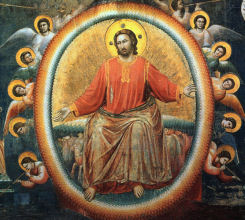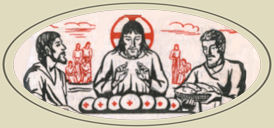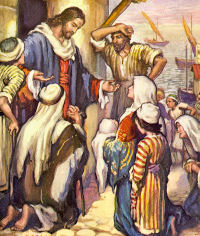» Enjoy our Liturgical Seasons series of e-books!
"Just as the weeds are collected and burned up with fire, so will it be at the end of the age. The Son of Man will send his angels, and they will collect out of his kingdom all who cause others to sin and all evildoers. They will throw them into the fiery furnace, where there will be wailing and grinding of teeth. Then the righteous will shine like the sun in the kingdom of their Father. Whoever has ears ought to hear." (Matt 13:40-43)
Click here for commentary on the readings in the Extraordinary Form of the Roman Rite.
The Optional Memorial of St. Apollinaris, bishop and martyr, is superseded by the Sunday liturgy.
Sunday Readings
The first reading is taken from the Book of Wisdom 12:13, 16-19 where the author reminds us that the kind of judgment we receive depends not on the scales of godless justice, but instead on the mercy and love of God for those who strive to live life in response to His love. — A Celebrants Guide to the New Sacramentary - A Cycle by Kevin W. Irwin
The second reading is from the Letter of St. Paul to the Romans 8:26-27. The theme is the activity of the Spirit in helping us in our weakness to pray as we ought, for it is the Spirit who makes intercession for us and intercedes for us before God. — A Celebrants Guide to the New Sacramentary - A Cycle by Kevin W. Irwin
The Gospel is from St. Matthew 13:24-43. Today's parable is Christ's answer to the question so frequently asked: "Why does God permit evil to triumph so often in this world, why are the wicked allowed to prosper?" The triumph of the wicked is short-lived, the reward of the Christian who suffers from their wickedness is everlasting. The very wickedness and injustices of evil-doers are one of the ways that God uses to perfect his elect. It is only on a battlefield that a true soldier can be proved.
 In the parable, the weed does not destroy the wheat. It only makes it more difficult for the wheat to grow to maturity. So it is with the Christian. No one can take his faith from him, but living up to it is made more difficult by the evil influence and bad example of sinners. If some succumb to this evil influence and give up the practice of their faith, the fault is theirs. God can force no man to serve him.
In the parable, the weed does not destroy the wheat. It only makes it more difficult for the wheat to grow to maturity. So it is with the Christian. No one can take his faith from him, but living up to it is made more difficult by the evil influence and bad example of sinners. If some succumb to this evil influence and give up the practice of their faith, the fault is theirs. God can force no man to serve him.
The patience of the farmer in letting the weed grow on until harvest time, exemplifies the infinite mercy of God toward sinners. The weed could not change its nature, but the sinner can change his ways and God gives him every chance and every help to do this, up to his last moment of life. No sinner will be excluded from heaven because of the sins he committed but because he did not repent of these sins while he had the opportunity.
We must learn a double lesson of patience from this parable. First, to be patient with those who make our spiritual progress more difficult for us—they are actually helping us to be better Christians if we bear with patience the injuries they inflict on us. Second, we must try to imitate the patience God shows in his dealings with sinners. While we must not approve of their evil deeds, or their sins, we must still look on them as our brothers and do all in our power to put them back on the right road to heaven. We can do this by good example, and by fervent prayer for their conversion. This is not easy for human nature, but we can be certain that God will give us the necessary grace and strength to subdue our natural weakness and aversion, if we try to act with charity and true brotherly interest toward our erring fellowmen.
By acting thus, we will not only be helping a weak brother on the rugged road to heaven, we will also be making doubly sure of our own arrival there, for God will never be outdone in generosity.
Excerpted from The Sunday Readings by Fr. Kevin O'Sullivan, O.F.M.
Commentary for the Readings in the Extraordinary Form:
Sixth Sunday after Pentecost
 "Taking the seven loaves. He gave thanks, broke them and gave them to His disciples to distribute; and they set them before the crowd. . .(about four thousand). . .And they ate and were satisfied" (Gospel).
"Taking the seven loaves. He gave thanks, broke them and gave them to His disciples to distribute; and they set them before the crowd. . .(about four thousand). . .And they ate and were satisfied" (Gospel).
"I have compassion on the crowd." Some of us may "have (had to) come from a distance" in our wanderings from God. But this sentiment of His Heart, so Divine, so human, inspires our plea to "save" us from eternal hunger in "the pit" of hell (Introit).
At Baptism we were reborn to a new life, to be "dead to sin, but alive to God" (Epistle). Daily with Christ we must die to sin and evil. Daily with Him we must rise to God and good works. Daily we would "faint on the way," famished with hunger, crying out: "How will anyone be able to satisfy (us in (the) desert" of life(Gospel)?
At the altar of sacrifice God will not allow the hopes of anyone to be "in vain" (Secret). Only at the altar will our instinctive hunger for God be really "filled" (Postcommunion).
Excerpted from My Sunday Missal, Confraternity of the Precious Blood






